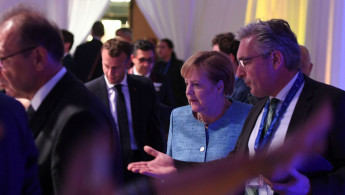EU leaders agree 'united approach' on Iran
European Union leaders agreed on a "united EU approach" to keeping the Iran nuclear deal alive after US President Donald Trump withdrew from the pact, a European source said after talks in Bulgaria.
The 28 EU leaders also backed a plan for dealing with trade tariffs that Trump is imposing on European metals, saying that the "EU will not negotiate with a gun at its head", the source told AFP.
"The EU will continue fighting for a rules-based international system despite recent decisions on climate change, tariffs and Iran," the source said after the leaders met over dinner in Sofia.
Their show of unity comes after EU president Donald Tusk lashed out at Trump, saying that "looking at the latest decisions of President Trump, someone could even think with friends like that who needs enemies."
On Iran, the leaders expressed backing for a plan including "EU support for JCPoA, as long as Iran respects the deal," the source said, referring to the deal's formal name, the Joint Comprehensive Plan of Action.
They also agreed to "initiate work to protect European companies negatively affected by the US decision," which involves Washington reimposing sanctions on Iran.
But with the US saying it had pulled out of the deal because of broader worries about Tehran's actions, the leaders said they would also "address concerns about Iran's role in the region, Iran's ballistic missile programme and what happens after 2025".
On trade, the EU leaders agreed to "strengthen" the European Commission as it seeks to negotiate a permanent exemption from US tariffs on metal and aluminium that are due to take effect on June 1, the source said.
If it gets the exemption, the source said the EU was ready to take steps including "voluntary regulatory cooperation" with the US, and working on reform of the World Trade Organisation, after Trump claimed the US was unfairly treated.
It was also ready to "improve reciprocal market access, for industrial products, including amongst others cars, and liberalisation of public procurement."





 Follow the Middle East's top stories in English at The New Arab on Google News
Follow the Middle East's top stories in English at The New Arab on Google News
![The UAE is widely suspected of arming the RSF militia [Getty]](/sites/default/files/styles/image_330x185/public/2024-11/GettyImages-472529908.jpg?h=69f2b9d0&itok=Yauw3YTG)
![Netanyahu furiously denounced the ICC [Getty]](/sites/default/files/styles/image_330x185/public/2024-11/GettyImages-2169352575.jpg?h=199d8c1f&itok=-vRiruf5)
![Both Hamas and the Palestinian Authority welcomed the ICC arrest warrants [Getty]](/sites/default/files/styles/image_330x185/public/2024-11/GettyImages-2178351173.jpg?h=199d8c1f&itok=TV858iVg)